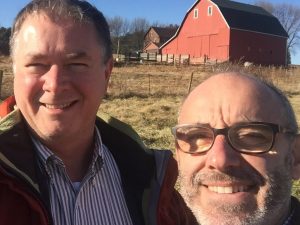Help grow the power of the PFI community. Donate today.
Douglas Rooney and Alfonso Valenzuela-Gumucio
 Douglas Rooney and Alfonso Valenzuela-Gumucio
Douglas Rooney and Alfonso Valenzuela-Gumucio
Carlisle – Gleann Daire Farm
Why do you want to farm?
Our desire to farm comes from something very primal. Humans have largely become urban creatures who are deeply lost in a haze of technology and entertainment. After living in that environment for most of our adult lives, we have found a profound desire to reconnect with our most basic relationship: our relationship with the land and the natural world (well, sort of natural, as farms are hardly natural).
We seek a lifestyle that connects us to the land, the weather and the challenges and opportunities of living with bugs, birds and beasts. We also feel strongly that local food is important, and we want to be producing local food.
What are you farming right now?
The Apiary: We lost our bees in the winter of 2018-19 and had to start again in spring 2019. We were able to do a limited honey harvest of about 30 pounds. We received a fifth-place ribbon for our honey at the Iowa State Fair in 2019.
The Sheep Barn: In summer 2019, we renovated the east end of Shed #2 into a sheep barn. We currently have nine ewes and one ram of the Romeldale-CVM breed. This is a fine-wool sheep breed that is currently endangered. Its wool is prized by home spinners and crafters for its texture and naturally multi-colored wool. We intend to be part of the breeding program to bring this sheep back from the brink. Breeding stock will be our main product, and we can sell some nice wool while we are at it. The sheep are rotationally grazed on pasture using electric net fencing. We started planted trees in fall 2019 to begin the process of converting the wide-open pasture into a silvopasture environment.
The Hen House: In summer 2019, we renovated the west end of Shed #2 into a winter chicken coop and currently have 39 laying hens (and four roosters). We are designing a mobile chicken coop unit that will let us move the chickens in rotation on the pasture. Currently, we are producing about 11 dozen eggs per week. We intend to increase the laying flock to 75 in 2020.
Additionally, we baled hay on 5 acres of our pasture in summer 2019.
We currently have two EQIP contracts with USDA to construct a 30-by-96-foot high tunnel and implement a rotational grazing plan. The high tunnel will be used to grow produce and cut flowers. The grazing plan will help construct perimeter and interior fencing, interseed a legume seed mix and add a watering system.
What’s your vision for your farm?
We envision a small farm with a great deal of diversity. We feel diversity is the key to sustainability and the ability to roll with the punches when one of your enterprises fails in an individual year. Our densely packed little farm will have multiple streams of income from both farm and farm-related endeavors.
We strongly believe in the power of local food systems and their ability to build community. Through our on-farm roadside stand, we hope to invite the community in to see the possibilities of fresh, wholesome food produced by people they know, on a farm they drive by every day.
Why do you want to participate in this program?
We believe the mentoring and business plan work will allow us to hone, refine and bring focus to the most practical and profitable enterprises we have been considering. At the same time, we feel ongoing networking with other farmers will let us keep our goals realistic and maintain a work-life balance. We are looking for experience and wisdom to keep us grounded.
